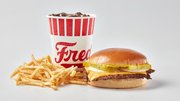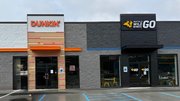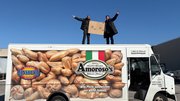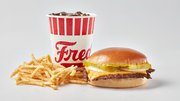Article
COO: Newk's riding high on 'second wave' of fast casual
Jim Greco, newly-appointed COO of Newk’s Franchise Company, sees an opportunity for the chain to supplant early leaders like Panera thanks to culinary-driven menus, open kitchens and exceptional levels of hospitality.

November 11, 2014 by Brenda Rick Smith — Editor, Networld Media Group
With same-store sales topping last year by 6 percent, Newk's says it is outpacing the rest of the restaurant industry. With AUVs of close to $2.4M, its performance rivals larger players like Jason's Deli ($2.5M), Panera ($2.4M), and Chipotle ($2.1M), according to the company's franchisee marketing brochure.
The company also expects 16-percent new store growth in 2014, including six franchise locations set to open in November and December.
 Jim Greco, newly-appointed COO of Newk’s Franchise Company, believes the chain is is part of a "second wave" of fast casual restaurants set to overtake the segment's first wave. Greco joined Newk's in September after time at the helm of Sbarro from 2012-2013.
Jim Greco, newly-appointed COO of Newk’s Franchise Company, believes the chain is is part of a "second wave" of fast casual restaurants set to overtake the segment's first wave. Greco joined Newk's in September after time at the helm of Sbarro from 2012-2013.
"I've been in fast casual for just about as long as it's been called 'fast casual,'" said Greco, who is credited with turning around Breugger's Bagels during his tenure as CEO from 2003-2011.
What differentiates the 'second wave'
Greco sees an opportunity for Newk's to supplant early, "first wave," leaders like Panera thanks to culinary driven menus, open kitchens and exceptional levels of hospitality.
Newk's is constantly tinkering with its broad menu, said Greco, trying out new things on its menu four or five times per year.
Newk's also prepares menu items fresh, in house.
"The result is a much more flavorful, a much more craveable menu," said Greco, "And the quality of food at Newk's is better than the offerings in most casual dining establishments."
Being able to see the food being prepared makes a difference for customers and reinforces brand messaging, Greco added.
"You can see all of this preparation taking place," said Greco, "which communicates and reinforces the concept of fresh, made to order, high quality food."
How that food is delivered is the third major differentiator between the first and second wave of fast casual restaurants, Greco believes.
"We don't give you a buzzer, we don't call out your name to come get your food, we bring it to you," said Greco. "When you are done, you don't have to get up and bus your food. We come and get your plates."
That high level of customer service pays off, because there are always crew members circulating through the dining room, ready to attend to customer needs. Other fast casual concepts are also adding crew members to the dining room in an effort to elevate guest experience.
"It's as close as you can get to casual dining," said Greco.
Fast casual vs. other segments
The casual dining comparison seems ironic, because even as fast casual concepts like Newk's are gaining momentum, casual dining has hit a rough patch.
Casual dining is a casualty of changes in consumer lifestyle, said Greco. Diners are more time pressed, especially at lunch. Constant connection to social media, email and other communication tools make it "impossible to leave work behind" and take time out for a meal, he said.
Price pressures add to the equation.
"The fact that median household income has not changes since the mid-90s means there's a large segment of the population that is more cost sensitive than ever," said Greco. "Fast casual provides an opportunity to have the same quality meal in the same quality environment at lower prices."
That price pressure has not necessarily translated into success for QSR restaurants, however.
The QSR segment is a victim of its own success, said Greco.
"Success causes people to not want to tinker with things, to not want to experiment, to not want to take risks, to not want to change," said Greco. "You wake up one morning and you find yourself outmaneuvered by upstarts. That's what happened to quick service."
The prized millennial
Greco is not deterred by the fact that the much-coveted millennial audience still visits QSRs more often than fast casuals, which he attributes to price sensitivity.
"Whether we are talking about millennials, older folks, younger folks, those who are price sensitive are going to limit their visits to fast casual based purely on economics," said Greco. "Millennials have very much grown up in an environment where they are very much aware of what they eat. The compelling nature of fast casual is going to be the driving force despite economics."
Greco is betting on that momentum to push Newk's from its current footprint of 70 units to 200 by 2018. Newk's plans to open more than 25 new company-owned and franchise restaurants in the Southeast in 2015.
He's brought aboard a colleague from his days at Brueggers, Chris Cheek, as chief development officer. Cheek will oversee real estate and site selection.
Newk's strong unit level economics, leveraged with the strength of the fast casual segment, make the brand attractive to franchisees, said Greco.
"Fast casual is really the driving force in the restaurant industry. If you look at restaurant sales growth, the other categories are flat or negative," said Greco. "Newk's is really at the forefront of that in the second generation of fast casual. We think that is a really great place to be."
 ChatGPT
ChatGPT Grok
Grok Perplexity
Perplexity Claude
Claude














